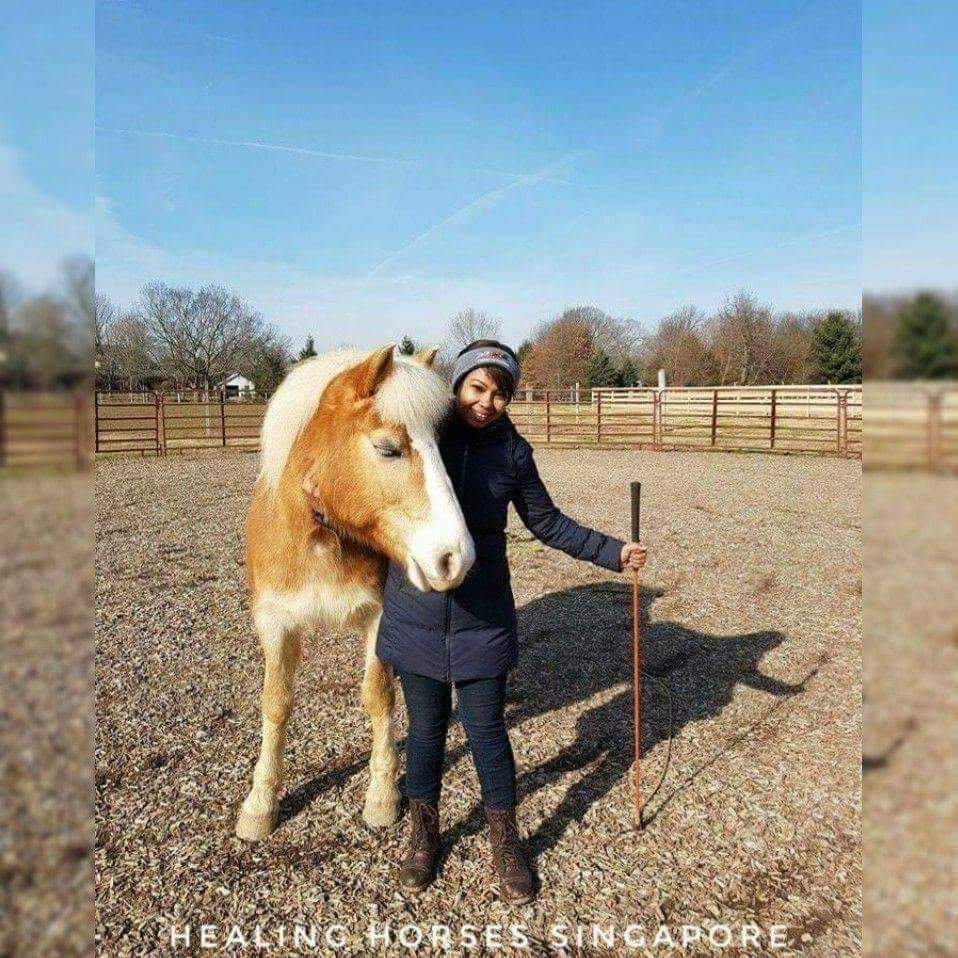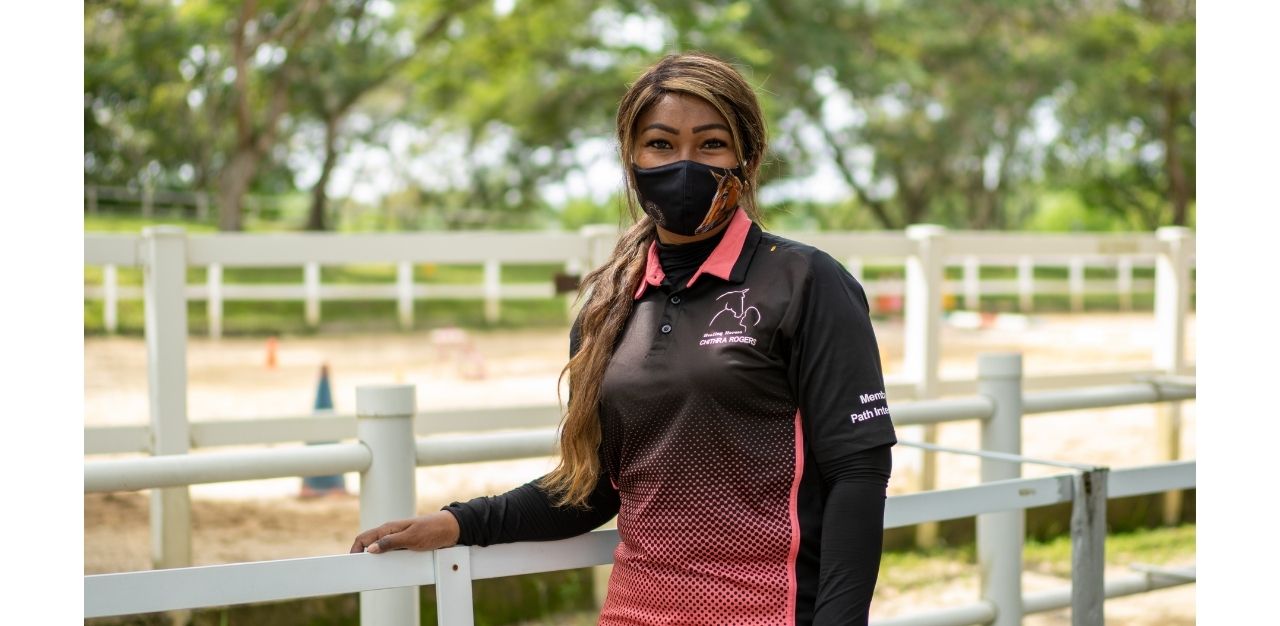She had always wanted to be a racehorse jockey and even had big plans to train in Brisbane, Australia.
“My mum was concerned about the dangers involved in racing, so she wasn’t too keen,” says Ms Chithra Rogers, Founder and Programme Director of Healing Horses. “Besides, she also wanted me to continue my studies since I was only 16.”
But her dad encouraged her and she eventually went ahead to pursue her passion abroad for two years.
“ I was terribly, terribly homesick,” she says. She felt torn between her aspirations and family, so she returned to Singapore after completing her studies and with the proper certifications.

Her realisation that she didn’t want to leave her family again was the point at which she decided to get creative with her career options. That was when she found a way — to help improve the lives of those with special needs through horseback riding.
“My first passion has always been horses. Second, children,” she says. “Even when I was training in Australia, I spent all my free time volunteering with Riding for the Disabled (RDA) Australia to help kids with various disabilities.”
That prompted her to pursue her tertiary education in child psychology and equine therapy, and she trained under the chairperson of RDA Australia.
She returned to Singapore, and it was 10 years ago that she founded Healing Horses, a social enterprise that focuses on early intervention for young children and teenagers with special needs. Today, Ms Rogers is pursuing her masters in special needs education.
The HomeGround Asia caught up with Ms Rogers at one of her sessions to learn more about what it’s like to be an equine therapist, her methodology, the day-to-day struggles she faces and how she manages both horses and her special needs students.

The HomeGround Asia (THG): Is every lesson the same?
Chithra Rogers (CR): Most of the exercises aren’t one-size-fits-all. [At Healing Horses], I actually tailor every programme based on each individual. The parents [first] fill up the questionnaire form to explain the issues the children are facing. [Then,] they’ll come for a trial lesson, and based on which I’m able to understand their needs better for the next ten weeks.
For Bella, [for example], I started working on her core areas, because her mum mentioned that she was not able to sit upright. So I thought that it was really important to work on her posture and trunk control before she could start walking with proper strides.
I do have students who are twins and on the same spectrum, but I’ve tailored different programmes for each child because they face different challenges.
THG: What are the challenges you face doing what you do in Singapore?
CR: Initially, it was quite a challenge helping parents understand horse therapy. This is especially so in Singapore’s context where the awareness is really limited. I would say now, parents at the school have seen progress in their children, and [have started] to share with other parents, so the awareness is growing.
THG: Are there specific breeds of horses that are better suited for therapy?
CR: There are many breeds of horses, but the best recommended [for equine therapy] is quarter horses. The quiet-natured ones are the best. Some of the kids have sudden movements, so ex-polo horses are especially suitable because they are not as easily spooked. Polo is quite rough and tough, and so they’re already adapted to [these sudden] movements.
THG: Are there any risks involved in horse therapy? How do you manage them?
CR: With horses, there are definitely risks. So, prior to any of the sessions, we’ll do some walks first to check the horse’s mood. Of course, sometimes they do not react prior to the session, but during the session [itself]. It could be [because of] the noises nearby, or something else triggering them — [in which case] we will immediately dismiss the session and dismount the child.
[We also have to observe] the child’s mood, and make sure the handlers are able to communicate with each other and the child. In [case] of an emergency, [we have to know] who would be the one to pull the child out, stuff like that. During that whole process, everyone needs to be alert.
THG: Do you face any unique challenges when managing a child with special needs?
CR: We have aggressive children — not because they want to be aggressive, but because they are on the spectrum and experience sensory overload. When that happens they tend to be very fidgety, especially when they are non-verbal.
Most of their communication methods when they are frustrated would be to hit or bite. [But] once they are on the horse, they’re in a different world. They are very excited, [yet] they are very calm. They are much more manageable when they are sitting on the horse, because the horse’s movements and gait actually help to regulate the kids emotionally and calm them down.
THG: Could you recount an especially rewarding moment on the job?
CR: There was this seventeen-year-old teenager who had never spoken a word before in his life. So, after the riding session, we usually bring them to feed and groom the horses, to teach them an appreciation for the animal for giving them the ride. When I gave him a carrot treat to feed the horse, I mouthed the word, “carrot”, and told him to repeat after me. He was trying his best, and finally, he did manage to say the word.
When I told his parents, they did not believe me. The next time around, I managed to record it. His mum was so happy, she had tears of joy.
THG: What do you wish our readers to know about Healing Horses?
CR: At Healing Horses, we provide free lessons for single mothers. I highly support single mothers with special needs kids. It’s really challenging for these mothers, who don’t have financial or physical support to help the children. So the mothers actually have to choose between work and taking care of the children’s needs.
Having a kid with [special] needs, even in a [nuclear] family, is especially challenging. The main caregiver is the mother and she needs a lot of emotional support. It’s really easy for her to burn out. So I encourage organisations and riding schools that are providing similar services to come forward to help single mothers.
I do have overheads to cover and we’re not a charitable enterprise, but I try my best to help within my means. For lower-income families, I also accommodate flexible payment methods.
CR: My wish is for Healing Horses to be given our own premises one day, so that I can approach the relevant authorities for subsidies. That way, parents who have more financial constraints can attend our lessons. We’re currently leasing from another organisation, which can be challenging. We have a long waiting list and it would be great if we could do lessons on Sundays!
For more information on Healing Horses and equine therapy, visit their website here.
Join the conversations on TheHomeGround Asia’s Facebook and Instagram, and get the latest updates via Telegram.




























